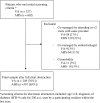Comparison of medicine resident diabetes care between Veterans Affairs and academic health care systems
- PMID: 19551447
- PMCID: PMC2710481
- DOI: 10.1007/s11606-009-1048-z
Comparison of medicine resident diabetes care between Veterans Affairs and academic health care systems
Abstract
Background: Although others have reported national disparities in the quality of diabetes care between the Veterans Affairs (VA) and private health care delivery systems, it is not known whether these differences persist among internal medicine resident providers in academic settings.
Objective: We compared the quality of diabetes primary care delivered by resident physicians in either a private academic health care system (AHS) or its affiliated VA health care system.
Design: Cross-sectional observational study
Participants: We included patients who: had a diagnosis of diabetes, had >2 primary care visits with the same resident provider during 2005, and were not separately managed by an attending physician or endocrinologist. A total of 640 patients met our criteria and were included in the analysis.
Measurements and results: Compared to the VA, patients in the AHS were more likely to be younger, female, have fewer medications, and be treated with insulin, but had less comorbidity. Patients in the VA were more likely to be referred for an annual eye exam (94% vs. 78%), receive lipid screening (88% vs. 74%), receive proteinuria screening (63% vs. 34%), and receive a complete foot exam (85% vs. 32%) in analyses adjusted for patient demographics and comorbidities (p-value <0.001 for all comparisons). In adjusted analyses, there were no significant differences in HbA1(c), blood pressure, or LDL cholesterol control.
Conclusions: In spite of similar resident providers and practice models, there were substantial differences in the diabetes quality of care delivered in the VA and AHS. Understanding how these factors influence subsequent practice patterns is an important area for study.
Similar articles
-
Effect of Veterans Administration use on indicators of diabetes care in a national sample of veterans.Diabetes Technol Ther. 2010 Jun;12(6):427-33. doi: 10.1089/dia.2009.0171. Diabetes Technol Ther. 2010. PMID: 20470227 Free PMC article.
-
Disparities in Quality of Primary Care by Resident and Staff Physicians: Is There a Conflict Between Training and Equity?J Gen Intern Med. 2019 Jul;34(7):1184-1191. doi: 10.1007/s11606-019-04960-5. Epub 2019 Apr 8. J Gen Intern Med. 2019. PMID: 30963439 Free PMC article.
-
Diabetes care quality in the Veterans Affairs Health Care System and commercial managed care: the TRIAD study.Ann Intern Med. 2004 Aug 17;141(4):272-81. doi: 10.7326/0003-4819-141-4-200408170-00007. Ann Intern Med. 2004. PMID: 15313743
-
Integration of women veterans into VA quality improvement research efforts: what researchers need to know.J Gen Intern Med. 2010 Jan;25 Suppl 1(Suppl 1):56-61. doi: 10.1007/s11606-009-1116-4. J Gen Intern Med. 2010. PMID: 20077153 Free PMC article. Review.
-
The role of the Veterans Affairs Medical Centers in patient care, surgical education, research and faculty development.Am J Surg. 2005 Nov;190(5):662-75. doi: 10.1016/j.amjsurg.2005.07.001. Am J Surg. 2005. PMID: 16226937 Review.
Cited by
-
Clinical outcomes of diabetic patients at a student-run free clinic project.Fam Med. 2014 Mar;46(3):198-203. Fam Med. 2014. PMID: 24652638 Free PMC article.
-
A Primer on Diabetes Mellitus: Foundations for the Incoming First-Year Resident.MedEdPORTAL. 2016 Sep 28;12:10469. doi: 10.15766/mep_2374-8265.10469. MedEdPORTAL. 2016. PMID: 31008247 Free PMC article.
References
-
- {'text': '', 'ref_index': 1, 'ids': [{'type': 'DOI', 'value': '10.1111/j.1525-1497.2005.0249.x', 'is_inner': False, 'url': 'https://doi.org/10.1111/j.1525-1497.2005.0249.x'}, {'type': 'PMC', 'value': 'PMC1490285', 'is_inner': False, 'url': 'https://pmc.ncbi.nlm.nih.gov/articles/PMC1490285/'}, {'type': 'PubMed', 'value': '16423110', 'is_inner': True, 'url': 'https://pubmed.ncbi.nlm.nih.gov/16423110/'}]}
- Holmboe ES, Bowen JL, Green M, et al. Reforming internal medicine residency training. A report from the Society of General Internal Medicine’s task force for residency reform. J Gen Intern Med. 2005;20(12):1165–72. - PMC - PubMed
-
- {'text': '', 'ref_index': 1, 'ids': [{'type': 'PubMed', 'value': '16785480', 'is_inner': True, 'url': 'https://pubmed.ncbi.nlm.nih.gov/16785480/'}]}
- Fitzgibbons JP, Bordley DR, Berkowitz LR, Miller BW, Henderson MC. Redesigning residency education in internal medicine: a position paper from the Association of Program Directors in Internal Medicine. Ann Intern Med. 2006;144(12):920–6. - PubMed
-
- {'text': '', 'ref_index': 1, 'ids': [{'type': 'PubMed', 'value': '16601254', 'is_inner': True, 'url': 'https://pubmed.ncbi.nlm.nih.gov/16601254/'}]}
- Weinberger SE, Smith LG, Collier VU. Redesigning training for internal medicine. Ann Intern Med. 2006;144(12):927–32. - PubMed
-
- Education ACfGM. ACGME Outcome Project: the general competencies. www.acgme.org. Accessed May 2009.
-
- {'text': '', 'ref_index': 1, 'ids': [{'type': 'DOI', 'value': '10.2337/diacare.22.5.661', 'is_inner': False, 'url': 'https://doi.org/10.2337/diacare.22.5.661'}, {'type': 'PubMed', 'value': '10332662', 'is_inner': True, 'url': 'https://pubmed.ncbi.nlm.nih.gov/10332662/'}]}
- Bernard AM, Anderson L, Cook CB, Phillips LS. What do internal medicine residents need to enhance their diabetes care? Diabetes Care. 1999;22(5):661–6. - PubMed
Publication types
MeSH terms
Grants and funding
LinkOut - more resources
Full Text Sources
Medical
Miscellaneous


